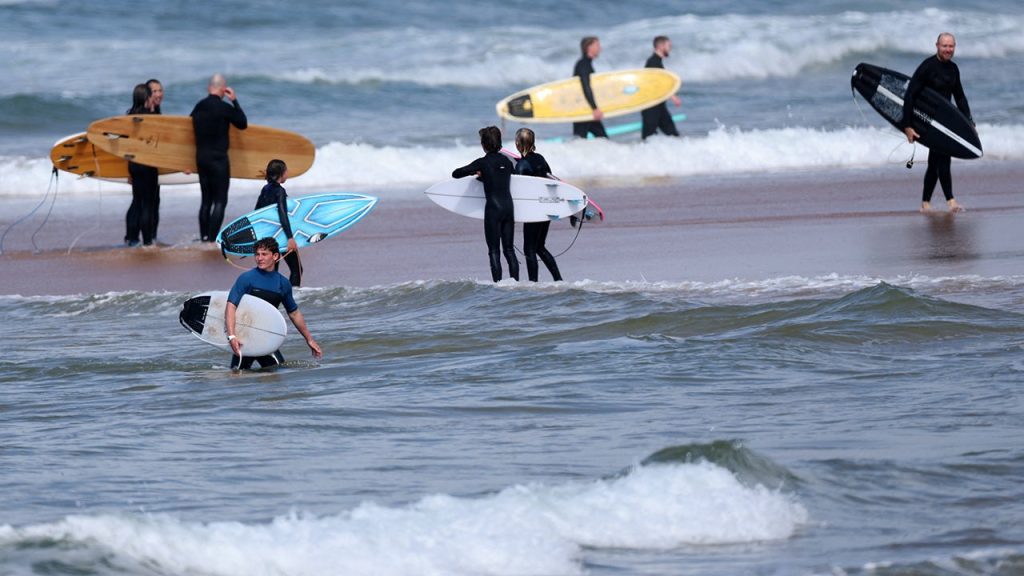Tragedy Strikes Sydney’s Long Reef Beach: Experienced Surfer Falls Victim to Fatal Shark Attack
In a heartbreaking incident that has shaken Sydney’s coastal community, a 57-year-old father and experienced surfer lost his life Saturday morning following an encounter with what authorities describe as a “large shark” at Long Reef Beach. The attack, which occurred around 10 a.m. local time, marks a rare but devastating reminder of the unpredictable nature of sharing the ocean with its apex predators. According to New South Wales Police Superintendent John Duncan, the victim suffered catastrophic injuries, including the loss of multiple limbs. Witnesses at the scene reported hearing desperate cries before the attack, with one bystander recalling the surfer’s pleas: “I don’t want to get bitten, I don’t want to get bitten, don’t bite me.” This same witness described seeing the shark’s dorsal fin emerge from the water, emphasizing its enormous size—a detail that has sent ripples of concern through Sydney’s tight-knit surfing community.
The tragedy unfolded during what should have been an ordinary Saturday morning surf session. The victim had paddled out around 9:30 a.m. with a group of five or six friends, all experienced wave riders familiar with the beach’s conditions. While his companions managed to make it safely back to shore, the 57-year-old suffered the brutal attack in deeper waters. In the aftermath, his body was recovered by fellow beachgoers who braved the surf to bring him to shore, but despite their courageous efforts, he succumbed to his injuries at the scene. First responders arrived quickly after receiving reports of a critically injured surfer but were unable to save him. The attack has left a wife without her husband and a young daughter without her father, transforming a routine weekend activity into an unimaginable family tragedy.
Following the incident, authorities closed Long Reef Beach indefinitely as they launched an investigation into the circumstances surrounding the attack. Northern Beaches Police Area Command officers recovered two sections of the victim’s surfboard, which have been submitted for expert examination to help determine the species of shark involved. This forensic approach may provide crucial insights into shark behavior patterns in the area and potentially inform future safety measures. While shark attacks remain statistically rare, this incident represents Sydney’s second fatal encounter in recent years, following a February 2022 attack that broke a nearly six-decade stretch without shark-related fatalities in the city’s waters.
Superintendent Duncan addressed reporters with visible emotion, describing the incident as a “terrible tragedy” that has deeply affected not only the victim’s immediate family but the broader coastal community. The surfing fraternity in Sydney, known for its close bonds and shared passion for the ocean, has been particularly shaken by the loss of one of their own. Social media channels and local surf shops have become impromptu memorials as friends and fellow surfers share memories of the victim, described by many as a skilled waterman who understood and respected the ocean. The incident has sparked conversations about the balance between enjoying Australia’s iconic coastal lifestyle and acknowledging the inherent risks of sharing the water with marine predators.
Australia’s relationship with shark incidents is complex and emotionally charged. The country’s extensive coastline and rich marine biodiversity make it one of the world’s shark attack hotspots, though experts consistently emphasize that such encounters remain extraordinarily rare when compared to the millions of beach visits that occur without incident each year. Various Australian states have implemented different approaches to shark management, from nets and drumlines to drone surveillance and tagging programs. This latest fatality will likely intensify debates about the effectiveness and ethics of these measures, particularly as marine conservationists point to the ecological importance of sharks and the need to protect these often-misunderstood creatures while ensuring public safety.
As the community mourns, marine biologists and shark behavior experts caution against fearful reactions, noting that understanding rather than panic is essential in moving forward. They point out that sharks rarely target humans deliberately, with most attacks believed to be cases of mistaken identity or investigatory bites. Nonetheless, for the family left behind—a wife now widowed and a daughter who will grow up without her father—such scientific explanations offer little comfort in the face of devastating loss. The tragedy at Long Reef Beach stands as a somber reminder of nature’s unpredictability and the profound impact such rare events have on families and communities. As Sydney’s beaches eventually reopen and surfers return to the waves, they will do so with renewed awareness of both the joy and the risk inherent in their beloved pastime, carrying with them the memory of a fellow ocean lover whose final wave came too soon.













